One of my online students just wrote me a letter, asking whether he needs to learn to read standard music notation, or are guitar tabs enough.
...a few guys locally who are in the local music biz and they all tell me that guitar, or any other instrument for that matter, should only be taught with the standard music notation...
This is an interesting question that will probably be asked by most guitar students at one time or another, so I thought it would be worth sharing my answer here:
Why guitar tabs rock
Let me start by saying that all of my guitar lessons use guitar tablature, no standard music notation.
Here is what tabs look like, and to give it context, this is for Sweet Child O Mine.
E|-------------15----14----------------15----14-------| B|----15----------------------15----------------------| G|-------14-12----14----14-------14-12----14----14----| D|-12----------------------12-------------------------| A|----------------------------------------------------| E|----------------------------------------------------|
This is because I think tablature suits the guitar better during the initial learning process, and learning guitar tabs is easy.
My reason for this is that unlike other non-fretted instruments (eg. piano, trumpet, saxophone, etc.), with the guitar, you can play any given note in a multitude of places. Where you should actually play the note, really depends on what's most convenient with regards to the cluster of notes you're playing for a riff for example.
There is always just 1 position, where it's most comfortable to play a given riff, and this is where tabs come in handy. It tells you where that position is. Standard music notation can't do that, so this makes things a whole lot easier for beginner guitarists. Learning guitar is hard as it is, why complicate it more?
The problem with tablature
The biggest problem with most tablature is that it doesn't convey the rhythm. This is a pretty big issue, since if you don't know what a song sounds like rhythmically, you won't be able to play it off tablature alone. You need to already be familiar with how the song sounds.
Higher quality tablature will have some sort of reference to the rhythm, but most don't.
Here is the same Guns n Roses song on a music sheet:

If you pick up a book on guitar theory, it will always teach standard notation as well, since that is the common written language of music.
For example, if a pianist looks at guitar tabs, he won't know what to make of it. There is no rhythm, there is no key signature, no notes, etc.
It would actually be funny to look at a pianists face, trying to make something out of guitar tabs 😀
The same is true vice versa as well though.
If a guitarist, who doesn't know how to read standard notation, looks at someone else's music sheet, he'll be stuck and look silly. This can be very uncomfortable in a band situation, even at the amateur band level.
Pros and Cons
Lets look at the details now.
Guitar Tabs Pros
Easy to learn - You can understand tabs in about 10 minutes. It's just numbers on lines showing you exactly where to put your fingers.
Shows you the best position - Unlike standard notation, tabs tell you exactly which fret and string to use. This is huge for beginners who don't know the fretboard yet.
Guitar-specific techniques - Hammer-ons, pull-offs, bends, slides - tabs show these perfectly. Standard notation? Not so much.
Perfect for visual learners - You're literally looking at a bird's-eye view of your fretboard. Makes total sense.
Tons of free tabs online - Want to learn your favorite song? There's probably a tab for it somewhere on the internet.
Guitar Tabs Cons
No rhythm information - This is the big one. Most tabs don't tell you when to play the notes, just where. You need to already know how the song sounds.
Only guitarists understand it - Try showing tabs to a pianist or drummer. They'll look at you like you're speaking alien.
Can create bad habits - Since tabs show the easiest fingering, you might miss learning proper technique or alternative positions.
Limited music theory - Tabs won't teach you about keys, scales, or chord progressions. You're just playing by numbers.
Music Sheet Pros
Universal language - Every musician can read it. Jam with a pianist, bassist, or horn player? You're all speaking the same language.
Complete rhythmic information - You know exactly when to play every note, how long to hold it, and where the beats fall.
Shows musical direction - You can see melodies going up and down on the staff. Makes it easier to "visualize" the music in your head.
Essential for theory - Want to understand scales, chord progressions, or write your own music? Standard notation is your friend.
Professional requirement - If you want to play in orchestras, big bands, or do session work, you need this skill.
Music Sheet Cons
Steep learning curve - This isn't something you pick up in an afternoon. It takes real time and practice.
Doesn't show optimal guitar fingering - Standard notation tells you what notes to play, but not the best way to play them on guitar.
Sight-reading on guitar is tough - Even if you can read notation, playing it on guitar right away is very hard. You need to know the entire fretboard. And with more complicated songs, I would say it is impossible.
Can slow down beginners - Learning guitar is already challenging. Adding notation reading on top can be overwhelming at first.
My experience
I've been involved with music since I was 8. I can read standard notation because of having learned the trumpet when I was young.
It's easier to "visualize" a melody in your head looking at standard notation, that is for certain. But if you wanted me to play a song on the guitar just by looking at standard notation, I definitely couldn't do it right away.
Sight-reading standard music notation and playing it on guitar is hard. You can do it easily on non-fretted instruments, but not the guitar. This is due to what I mentioned before, you need to know all of the notes on the fretboard, and find the optimal hand position for the riff, solo, phrase, etc. Definitely not for beginners.
So, is it important to learn to read standard notation?
All in all, it really depends on what your practical goals are:
- Casual players - Tabs are perfect for you. You want to learn your favorite songs and play them around the campfire? There are tons of free tabs online, and you can understand them in minutes. Don't overcomplicate things - tabs will get you playing the music you love without years of theory study.
- Jamming with other musicians - This depends on who you're playing with. If it's other casual guitarists, tabs work great since that's the common language in the hobby guitar world. But if you're jamming with classically trained musicians or doing any kind of formal ensemble work, you'll need standard notation to keep up.
- Rock/metal guitarists - Honestly? Tabs are probably enough for most of what you'll do. Modern guitar music in these genres is written in tablature, and that's what you'll find online for your favorite songs. The detailed notation in tabs actually works great for all those hammer-ons, slides, and bends that make rock guitar sound good1. Unless you're planning to write orchestral arrangements, stick with tabs.
- Classical guitarists - Standard notation isn't optional here, it's mandatory. Classical guitar music is loaded with specific fingerings, harmonics, dynamics, and expression marks that tabs just can't handle. You need to see the harmony, the crescendos, the accidentals that tell you something interesting is happening musically. Tabs will show you where to put your fingers, but they won't show you the musical story.
- Professional musicians - You absolutely need standard notation if you're doing session work or playing in ensembles. Other musicians expect you to read charts, and you can't show up to a gig with tabs when everyone else is reading sheet music. Professional guitarists use tabs mainly for writing down their own solos or refreshing songs they haven't played in a while, but standard notation is what pays the bills.
- Songwriters/composers - If you want other musicians to play your music, you need standard notation. Try handing a drummer or pianist a guitar tab - they'll look at you like you're nuts. Standard notation is the universal language that lets you communicate with everyone in the band, not just other guitarists.
- Music students - Understanding both tabs and standard notation is important for academic success. When you're writing papers analyzing classical compositions for example, having solid research and writing skills is essential. But help through, for example, this paper writer by SpeedyPaper writing service can aid music students tackle these academic assignments while they focus more time on actually mastering both tablature and standard notation.
Now with that being said, if you don't know how to read standard music notation already from having played another instrument, I don't recommend you start learning it as a beginner guitarist just yet. You have your hands full with learning the guitar already, don't complicate things more.
I would recommend learning standard notation and guitar theory once you reach an intermediate level.
The good news is that I've found that once students get to an intermediate level and they want to start improvising or writing music, they will take on a natural interest in theory.
How can you start learning theory and standard music notation if you are ready
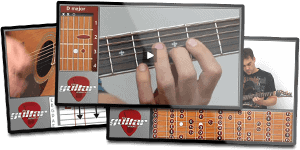
Unfortunately, I can't really give you any recommendations on guitar books. I only teach beginner-intermediate students, and I never recommend learning from a book at that stage, since I firmly believe that you can't learn music from a book. You need to hear the music, not read about it. This is why video guitar lessons are great.
I sprinkle in some theory in my lessons, but not much since they are made mainly for beginner-intermediate students. I do have a section on guitar specific music theory here though: https://www.theguitarlesson.com/guitar-theory/
Now if you want to get immersed in theory, I would recommend signing up with GuitarTricks or Truefire, they have more detailed video courses on guitar theory.
And once you are at a near advanced level, you can go for books like the Big Serious Guitar Book.
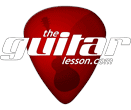
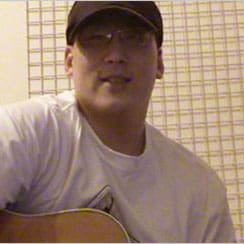
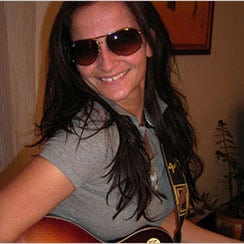
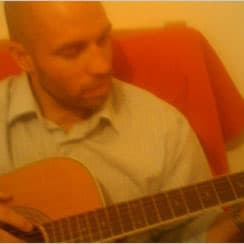
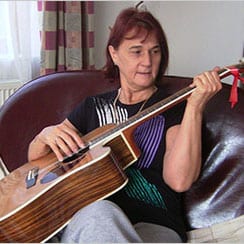
Thank you! This article was very helpful 👍
I play piano and guitar and can read both. Every thing you say is correct. Make learning as easy as possible. You sound to me like you know exactly what you are doing.
Thank you so much for this article. I am a pianist trying to learn the guitar and well…. looking at the tablature was quite a different approach. So my gratitude to you for showing tablature vs standard. God bless!
thank you for the article. I tried the standard notation but since I am a beginner it just confued me even more.. I will revisit this task once I am proficient with tabs..
Glad I could help!